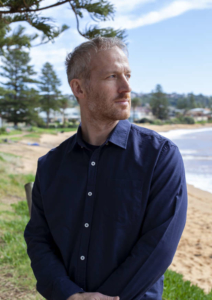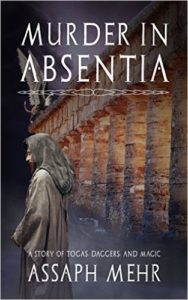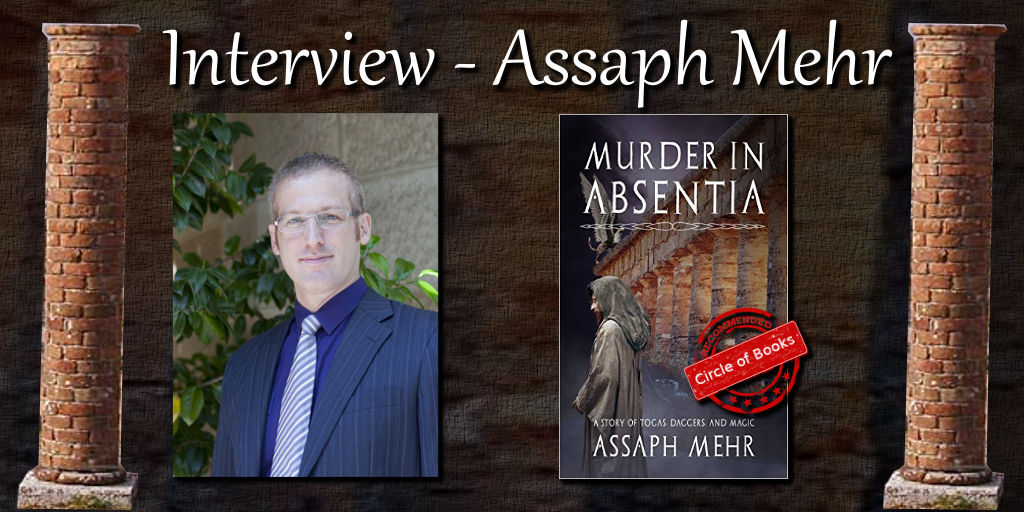Interview – Assaph Mehr
 |
 |
– When did you start writing novels, what moved you to start writing?
I started to write only recently. I had my nose in a book since I was a child, and whilst seeing my name in print was on my bucket-list, I never thought to actually go and do something about it.
I had the idea for a fantasy detective story and for the particular twist ending for a while. Then one hot night in January 2015 my wife complained that she had nothing good left to read, so I just sat down and started writing. And I didn’t stop until I finished the novel.
– In what genres do you write? Do you plan writing in other genres?
My “genre” is the Historically-themed Urban High-Fantasy Hard-boiled Detective (with a splash of Horror). I write in this, simply because that’s what I enjoy reading. I grew up on sci-fi and fantasy as well as classic detectives. I’ve always been partial to historical fiction, particularly that set in ancient Rome.
When it came time to write, I wrote what felt the most natural way to tell the story. This happened to be a story of a private detective solving a murder case, and set in a fantasy world inspired by ancient Rome. I worried less about the box it would fit in, and more about the integrity of the story and the world.
I have currently ideas for a few more Felix novels. After that, I’ll probably tackle another time period. I’m thinking of a retelling of the Crimean War from the Russian side – but with steampunk elements thrown in. Who wouldn’t enjoy a young and dashing Count Tolstoy with a mechanical arm?
Rather than mysteries this would be more of an epic science fantasy. I don’t see myself straying far from speculative fiction though.
– Tell us about your novels. Why should everyone buy them?
My novels lie in the intersection of Historical Fiction, Fantasy, and Mystery. What makes them stand out is the combination of genres and the attention to detail. Murder In Absentia is primarily a detective story, a whodunit. A lot of care has been put in for foreshadowing while still keeping the readers guessing through all the twists till the surprising resolution.
A similar level of attention to detail have been given to the world. The rich tapestry of ancient Roman daily life, woven into a high-fantasy setting for very memorable world. My readers say that the city of Egretia is almost a character in itself.
All in all, the reviews I have received on Amazon and Goodreads have been overwhelmingly positive. I am both honoured and humbled by the novel’s reception.
– What is your all time favourite historical fiction novel?
Just one? I could pick whole series…
I love Colleen McCullough’s Masters of Rome series. It’s the story of the late Roman Republic. Caesar is the main character, but the story starts ten years before he was born and covers events after his death. It is a masterful work, with tremendous literary value and amazing research that went into it.
I’d also like to mention three of my favourite historical detective series: Gordianus the Finder by Steven Saylor, Falco by Lindsey Davis, and Erast Fandorin by Boris Akunin (the last set in late 19th century Russia).
– You seem to have a special interest in ancient Rome, can you tell us where this interest comes from and what makes ancient Rome so appealing to you?
I think I first fell in love with ancient Rome through Asterix. I discovered them around the age of 10, and became completely enamored with the ancient world. When I was thirteen, my parents took me for a few weeks to Europe. My favourite part was Rome and Italy. I complained bitterly at churches with cherub paintings, but was happy to skip around the ruins all day long.
– Tell us a bit about your writing process.
I start with the idea of the book, what is the story’s essence. I know where I want to end, and I know where the plot starts. Form there I usually only do light plotting, and the writing becomes a collaboration with Felix (my protagonist). He’s telling me what his next steps are, and I complicate his life in return…
I keep the plot moving in the general direction of the ending I have in mind. I keep the story focused on its essence. Everything else is just sitting down and putting words to paper (or screen, as it is).
Once the first draft is completed, I do a few editing rounds. I try to keep a bit of space between rounds, to get some distance to see more details. I fix up anything that needs fixing (side plots that don’t work, better foreshadowing, fleshing out bits that could use extra impact etc.) I to use different formats when I read for editing too: I read on the kindle instead of the screen, I print out copies. It all helps in seeing the story in fresh eyes.
– What author would you love to have dinner with?
Whoever it will be, I will probably be star-struck and mumble incoherently…
I’d love to meet Steven Saylor, Neil Gaiman, Boris Akunin, and Stephen King.
Tell us about your hobbies and passions other than writing.
My family and kids are very important to me, and I try to spend time with them. So after my day job and the family, most of my free time now goes for writing.
I have been practicing martial arts for the past 30 years, on and off. I really enjoy this as a combination of physical and mental skills. I now train in an internal branch of Wing Chun (think Tai Chi, but very direct). In some ways, I have modelled the magic system of Egretia, or at least the learning process, on my experience with internal martial arts. It also affects my writing of fight scenes.
-We have many followers who would like to start writing a book or are already writing their first novel, any advice for these brave people?
Perseverance.
It just takes a lot of perseverance to finish the first draft. And then to edit it. And then edit again. And then publish. And then market. Just stick to it, do a little bit every day, and eventually good things happen.
I’ve also written an article for Lifehacker with some other tips, about how to write, edit, publish and market books (when going through the self-publishing route). You can find it here: http://www.lifehacker.com.au/2015/12/the-complete-guide-to-writing-your-first-novel/
But to provide the key takeaway for each main stage:
- Writing: Just do it. A little bit, but every day. Keep at it, until you finish that draft.
- Publishing: Never skimp on a good editor and a professional cover art. The difference they make is huge.
- Marketing: Start with reviews, build up to automated processes as you grow. It’s a job for the long haul, not overnight fame.
-How often do you write, daily, every other day or?
I try to write daily. With the first book I mostly made it. The current WIP is going slower – I blame the baby that came in between
However, hardly a day goes by without writing or otherwise working on my novels (research takes time too!), even if only for a little bit.
Do you keep a notebook with ideas for your novels? If so, do you carry the notebook with you so you won’t forget any ideas?
I keep all my ideas in OneNote, which is synchronized across computers, phones, etc. This can be anything from a one-liner idea for a future story, to detailed research notes and novel timelines.
If I’m on the go and have an idea I want to record, I’ll often just email it to myself, and later add it to the relevant section.
– Being an Historical Fiction author, it must be very important to do a good deal of research. How important is it in this genre to have your facts right and are there any instances when you bend history to fit your story?
I write Historical Fantasy, so there are quite a bit of things I changed from real history. Generally, I try to be as accurate as I can in aspects of daily life like food, gods, culture etc. However, the world itself is a fantasy world. I specifically did not want to be tied down to a particular year in Rome’s history, with its associated public figures and events.
– What are you reading at the moment?
About to finish “Catch the Moon, Mary”, by the talented Wendy Waters. It’s an enchanting story of a gifted musician, and the angels and demons she is dealing with. Waters does an amazing job in portraying damaged people, wrapped in a story with paranormal aspects.
– Certainly you have had some interesting episodes as an author, fans related or others, share one of them with us.
It seems that once I started writing, I couldn’t really stop. It’s really an exhilarating process. The inspiration for the stories comes from all places, and at all times. Just the other week, I watched a music video, got hooked, got a story idea – and the story started to nag at me. In fact, it insisted I drop everything else and write it down.
The singer in the music video absolutely loved it, even though it’s different from the song. I’ll let you be the judge of how it turned out: https://egretia.com/2016/06/22/girl-on-fire
– A final message for our circleofbooks.com readers.
Thanks for taking the time to read this far! In becoming an indie author, I have met many other fellow indie authors. This is a very supportive community. I have also been exposed to a lot of books I would never have tried otherwise. Books I enjoyed tremendously.
If you are here, you already appreciate indie authors. All I can say is, try new things. Don’t be afraid to read things outside of your comfort zone. At worst, you’ll find a novel not to your taste and drop it half way. At best, you will be exposed to a whole new world you never knew existed.
Thank you Assaph. We at circleofbooks.com wish you much success!
Click here to visit the Assaph’s page here on circleofbooks.com
